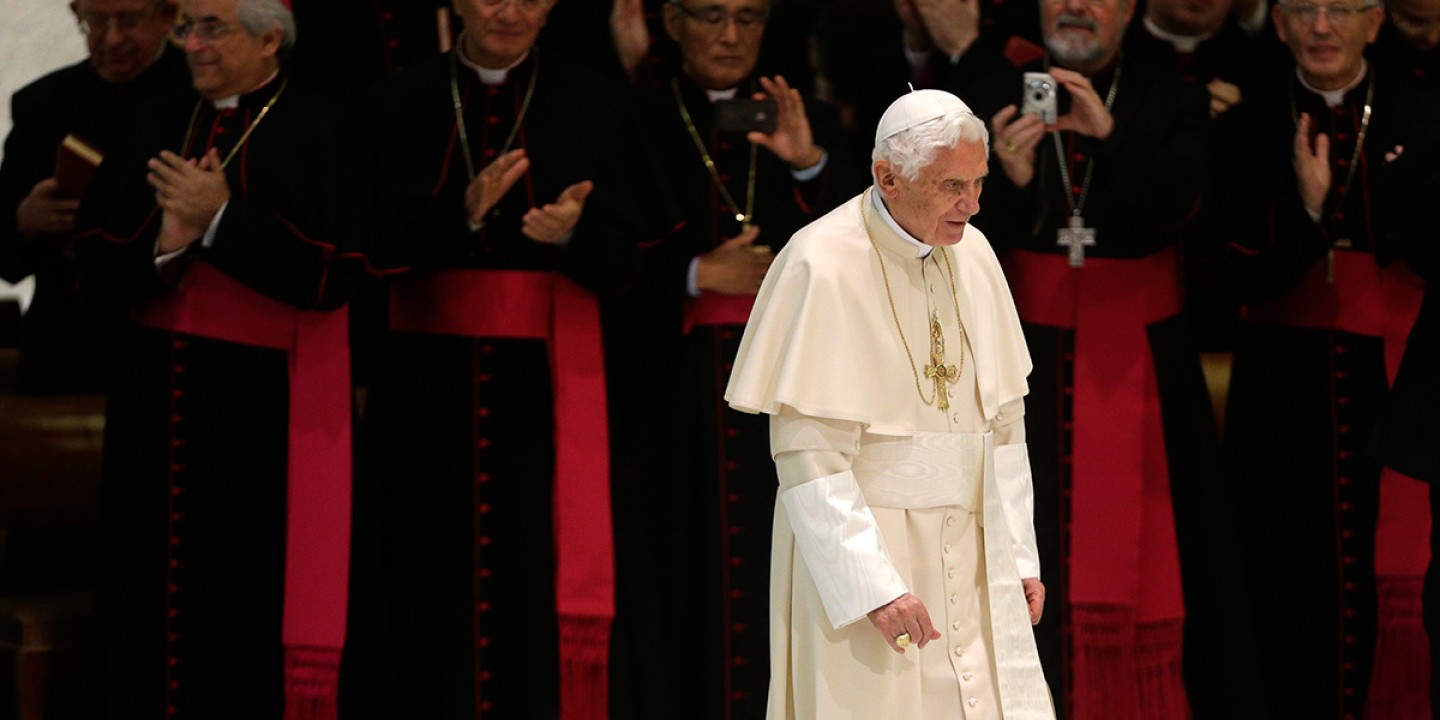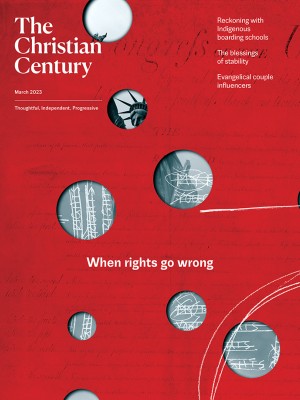Pope Benedict’s complicated legacy
Both his strengths and his failings are distinctly Catholic.

When reflecting on the life’s work of a public figure, it is natural to pick a moment in their career, a gesture or characteristic, that stands as symbolic of their legacy. We can’t define anyone’s character through an isolated idiom, but we can pinpoint choices they made that are key to understanding their influence.
When it comes to the late Pope Benedict XVI, born Joseph Ratzinger, I can think of no such idiom. I can point to his tenure at the Vatican’s Congregation for the Doctrine of the Faith, when he was known as “God’s Rottweiler” because of the rigidity with which he policed the boundaries of what he understood as orthodoxy. I can talk about his sophisticated theological contributions to the Catholic intellectual tradition. I could focus on his resignation from the papacy or the way he became a figurehead, against his will, for the traditionalist Catholics who oppose his successor, Francis. And I would be morally irresponsible if I did not acknowledge that Benedict, though he did better than John Paul II in his response to the ongoing clergy sexual abuse crisis, was complicit in a powerful and widespread system that protected predators rather than survivors.
Read our latest issue or browse back issues.
But no singular detail suffices as an index to his personality or the role he played in the contemporary Catholic Church. Because Benedict occupied a place in history where multiple social forces intersected, people often projected onto him what they wanted to see. It is impossible to write about his influence without glancing at these projections, but it would be a mistake to treat any as definitive or even accurate.
I have done my own share of projection. I was a member of the John Paul II generation, Catholics who came of age during the pontificate of the charismatic, telegenic Polish pope. Our faith life was marked by his influence. We shouted “JP II, we love you!” at World Youth Day, enthusiastically gathered at antiabortion events like the March for Life, and understood ourselves as enlistees in a grandiose culture war fighting for the good, the true, and the beautiful. At places like Franciscan University, where I pursued two of my degrees, devotion to John Paul II was more than just a facet of faith; it was socially obligatory.
As an ambitious philosophy student with conservative inclinations, my interest in John Paul was scholarly as well as pious. It would not have occurred to me to think of Ratzinger, then the prefect of the CDF and a close confidant of the pope, as anything other than an impressive and formidable theologian and one of our strongest leaders.
When John Paul died in 2005, Benedict stepped reluctantly into the spotlight of papal celebrity that was his predecessor’s legacy. A reserved and scholarly man in contrast with the effusive John Paul, he did not relish publicity in the same way, though he accepted it. And while he did not inspire in young culture warriors the movie-star adoration they had for John Paul, most were happy to transfer fidelity to him.
By then I had left their ranks. I no longer believed that conservative Catholicism was the cure for the world’s ills, and I’d grown distrustful of both the ideals we fought for and our methods. I began to understand that, in a world that has seen the systemic oppression of women, chattel slavery, colonial conquests, the Holocaust, and the bombing of Hiroshima and Nagasaki, it was ludicrous to imagine that human civilization is under some unprecedented attack by LGBTQ people and women who use birth control. Though not yet a progressive I had learned to call myself a feminist, and I was beginning to suspect that the theologians I’d been told were dangerous, many of whom were silenced by Ratzinger, might have valuable insights. So my view of the new pope, while positive, was also critical.
But when Benedict published his first encyclical, Deus caritas est (God is love), I found that God’s Rottweiler approached the topic of love with warmth and nuance. I was especially struck by his positive view of eros, the species of love marked by desire or a longing to receive. Benedict affirmed what I had often argued: that eros is connected to, rather than distinct from, the self-giving love known as agape. Given the widespread distrust of eros and the erotic in the conservative scholarly world I had inhabited, I had not expected to find my views supported by the famously traditional Ratzinger.
This was not the last time this pope would pleasantly surprise me. Throughout his papacy I referred frequently to his writings in defense of social justice, democratic socialism, care for the environment, and our proper relationship with the truth as Christian academics. As I morphed into a progressive scholar, I often found in Pope Benedict a brilliant, and unlikely, ally.
As a young theologian, Ratzinger was reputed to have had more liberal views, keeping company with theologians like Karl Rahner and Hans Küng. One could view his conservative turn, born out of his reaction to radical youth culture in the late 1960s, as an aberration. But if it was an aberration, it was one that carried on for decades, up until his death. Were Benedict’s teachings on politics, society, economics, and the environment indications that he never completely rejected his more liberal theological roots?
Benedict himself denied that his theological positions changed over the years. Perhaps his emphases shifted as he responded to new cultural trends. I am not one to eschew “liberal” and “conservative” as labels or to claim that Catholic thought transcends politics, but in this case, what looks like an ideological metamorphosis could be explained by the fact that many values our society marks as progressive—such as economic justice, protection of the environment, and a rejection of individualism—are more deeply rooted in Catholic tradition than contemporary conservative beliefs about male supremacy and heteronormativity are. Benedict’s great strengths, and his worst failings, can be better understood when we recognize how fully he inhabited the Catholic tradition.
In the years following Benedict’s abdication, I grew increasingly aware of that tradition’s failures. Benedict’s treatment of some of the most important theologians of his era looks especially scandalous when we compare it with the lenience he and other institutional leaders showed toward clergy guilty of horrific assaults. Feminist and liberation theologians could have used the second chance—and third and fourth chances—given to predator priests. When we realize how often the leaders who excoriated LGBTQ people as “unnatural” contorted themselves to make excuses for men guilty of rape and assault, it is impossible not to be angry. Anger may be the only moral option.
And yet, given the current trend of rapidly canonizing popes, the wheels of the canonization machine may begin to turn, soon and rapidly, as they did after the death of John Paul II. Those Catholics who adored Benedict’s reinstatement of traditional liturgical forms, including the old Latin mass, but who seem to have missed his calls for economic and environmental justice are poised to manufacture a cult of Benedict, another celebrity pope. I suspect Benedict would have found this deeply repugnant.
In the end, whether Benedict was a holy man—or a Catholic saint—is not for me to decide. Certainly he was a brilliant, stalwart, and complicated person who was motivated not by longing for glory or power but by care for the tradition entrusted to him. His legacy is also complicated.
We can honor Benedict’s passionate devotion to the truth by being truthful about the good Benedict did, including his exceptional contributions to the body of church teaching and his eventual decision, as pope, to crack down on predators. We can give him credit for doing what John Paul did not. At the same time, truthfulness demands that we recognize that he was actively complicit in harming liberal theologians, LGBTQ people, and clergy sexual abuse survivors. Benedict recognized and apologized for his errors in handling the abuse crisis, but an apology doesn’t undo the harm. Those he harmed and those who love them are unlikely to think warmly of the late pontiff.
Benedict’s final words were, “Lord, I love you.” I can be critical of him and still take this simple declaration, and all that it entails, as a guideline. My best tribute to Benedict would be to live out that love for God and God’s creation, love for God as imaged in every living thing, and fidelity to truth and our conscience, even when it hurts to do so.





